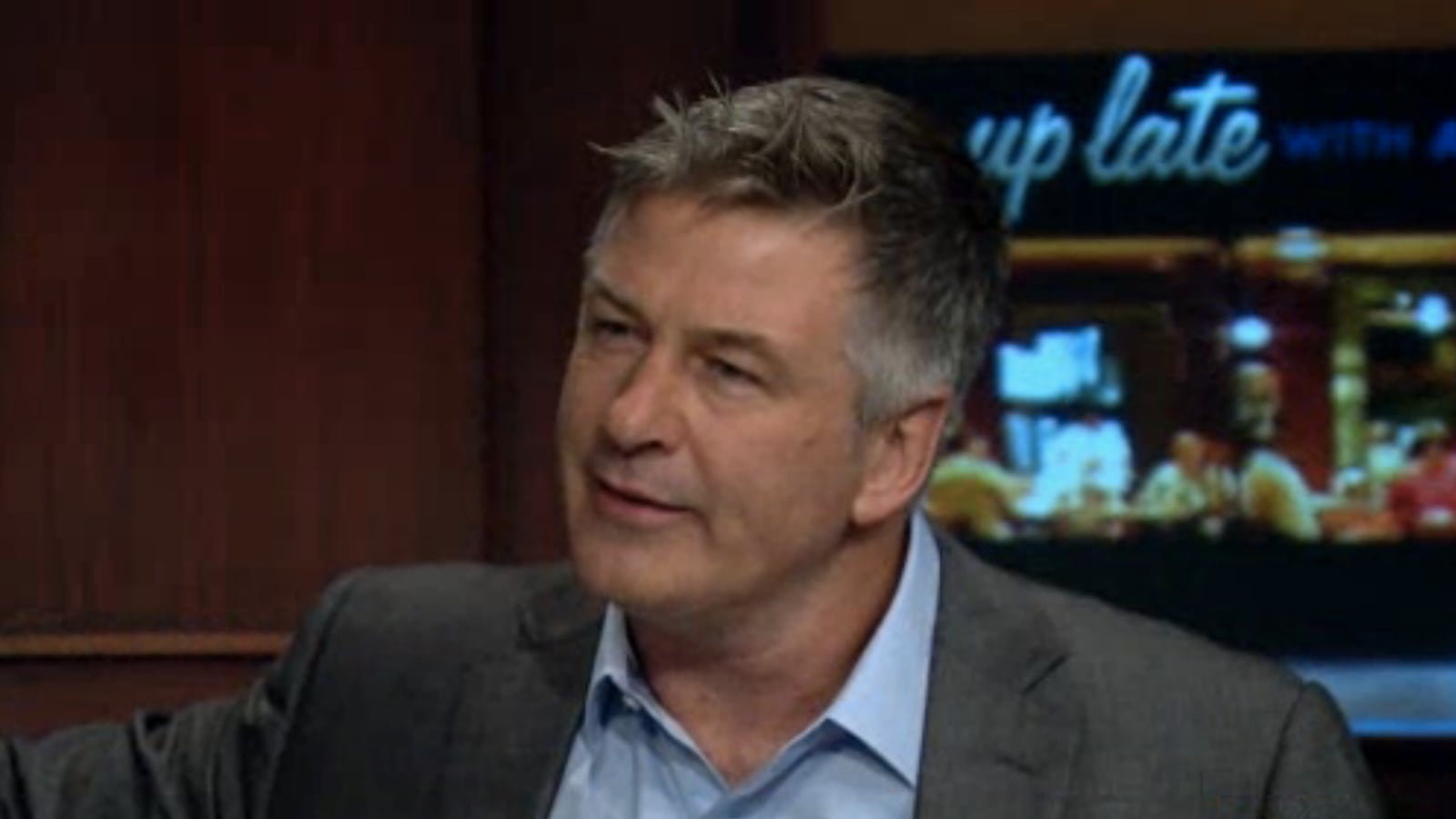This is a terrible and surprising question, but is Alec Baldwin really that boring? After watching him chat sedately with New York mayoral candidate Bill de Blasio for the premiere of Up Late with Alec Baldwin, MSNBC’s latest offering at 10 p.m. Friday, I can’t help asking.

Baldwin is a gifted actor, a brilliant comic, and a worthy—often volatile—opponent of pushy paparazzi, New York Post reporters, Fleet Street hacks, discourteous Starbucks baristas, bossy flight attendants, and anyone else who has the misfortune of getting on his bad side. He has raised pugnacity to an art form, as when he told me years ago, when I was writing a celebrity column for the New York Daily News and he was having a dispute with famed stylist and costume designer Patricia Field, that she was “a fruit-salad head,” “a whack-job, 24-7,” and “a cranky, miserably unhappy woman.” I probably shouldn’t admit it but that made me laugh.
He is also a smart, thoughtful guy, and—on his recently-ended WNYC radio podcast Here’s The Thing, anyway—a compelling and skillful interviewer. All of the above would seem to make for exciting, even dangerous, television. It certainly wasn’t crazy for MSNBC President Phil Griffin to hire Baldwin to freshen up a weekly time-slot previously occupied by the prison reality series Lockup and, before that, Alan Keyes Is Making Sense, starring a voluble, rabidly right-wing African-American politician who, when his show was cancelled after six months, went on to lose to Barack Obama in the 2004 Senate race in Illinois.
And yet.
Baldwin’s debut as a TV talk show host didn’t do him or his audience any favors. The choice to launch a much-hyped national program by devoting a full hour to a candidate for local office—in the midst of a titanic struggle in Washington, no less—was eccentric to say the least, even if you believe (as I do) that New York is the greatest city on earth. It’s difficult to imagine that viewers in California or Colorado were riveted by a stolidly affable gabfest about the ins and outs of affordable housing; the political, cultural and economic tensions between Manhattan and the outer boroughs; the evils of the police department’s stop-and-frisk policy; the self-evident sins of Wall Street; progressive efforts to raise the city’s minimum wage, and whether New York Gov. Andrew Cuomo will countenance de Blasio’s platform of hiking taxes on the wealthy.
“You’re mischievous, sir!” de Blasio quipped when Baldwin suggested that Cuomo’s stance on such issues would be influenced by his ambitions for higher office.
Mischievous? If only.
The 55-year-old Baldwin, who has publicly mused about the possibility of running for office himself someday, seemed less motivated by curiosity—a necessary characteristic of any interviewer—than by a wish to portray himself as supremely well-informed, laudably public-spirited, and above all serious.
Baldwin, who to his credit acknowledged that he’s a de Blasio partisan, never challenged his guest; he simply agreed with him. When the conversation threatened to get interesting or affecting, as during a brief discussion of de Blasio’s tumultuous upbringing by a single mother after his parents’ divorce, Baldwin seldom missed an opportunity to steer it back to “policy.” He decorously neglected to ask the candidate about the impact of his father’s suicide—which is the polite thing to do in a social situation, but malpractice in a television interview.
Meanwhile, Baldwin persistently referred to de Blasio as New York’s next mayor until the candidate—admittedly the prohibitive frontrunner as a Democrat in an overwhelmingly Democratic city--reminded his host that first there must be an election. The existence of de Blasio’s Republican opponent, Joe Lhota, went unmentioned.
The encounter was staged in a fake, green-upholstered restaurant banquette framed by a fake picture window showing nighttime Manhattan from Brooklyn, all fabricated in a studio at 30 Rock. Baldwin introduced the show wearing a jaunty blue blazer, but conducted the taped interview wearing a sober gray suit. So much for continuity. It didn’t enhance the program’s pacing or immediacy that what aired was obviously an edited version of an even more prolonged dialogue; commercial interruptions, signaled by the welling-up of the show’s jazzy film-noir theme music over the dangling conversation, almost came as a relief. (Baldwin—who has proved himself a capable performer during his many guest-hosting appearances on Saturday Night Live—apparently refuses to wear an earpiece or discipline himself to the time-limits of a talk show.)
All of which is to say that unless MSNBC intends to retitle its new program Up Late and Dozing Off with Alec Baldwin, somebody needs to--as they say in those ubiquitous low-testosterone commercials—“turn it up.” The ingredients are potentially there to produce an entertaining, engaging hour. I’ll leave it to the TV professionals to figure out how.





